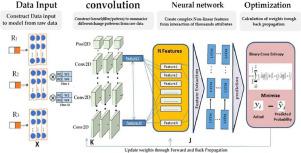Computers & Electrical Engineering ( IF 4.0 ) Pub Date : 2021-06-30 , DOI: 10.1016/j.compeleceng.2021.107271 Ahmed A. Mubarak , Han Cao , Ibrahim M. Hezam

|
Predicting students' performance is critical in Massive Open Online Courses (MOOCs) in order to benefit from many aspects such as students' retention and make timely interventions. In this paper, we propose a hyper-model of Convolutional Neural Networks and Long Short-Term Memory, called CONV-LSTM, in order to automatically extract features from MOOCs raw data and predict whether each student will drop out or complete courses. We consider class imbalance problem, which means that models will be biased to yield good results on the majority of class examples and poor results on the minority of class examples. In that case, model prediction is inaccurate, which means that the false negative rate is high. To reinforce better prediction performance, a cost-sensitive technique is used in the loss function, which considers the various misclassification costs for false negatives and false positives. The proposed model shows a better performance when compared to baseline methods.
中文翻译:

大规模开放在线课程中学生辍学预测的深度分析模型
在大规模开放在线课程 (MOOC) 中,预测学生的表现至关重要,以便从学生保留和及时干预等多方面受益。在本文中,我们提出了一种卷积神经网络和长短期记忆的超模型,称为 CONV-LSTM,以自动从 MOOC 原始数据中提取特征并预测每个学生是否会辍学或完成课程。我们考虑类不平衡问题,这意味着模型会偏向于在大多数类示例上产生良好的结果,而在少数类示例上产生较差的结果。在这种情况下,模型预测是不准确的,这意味着假阴性率很高。为了加强更好的预测性能,损失函数中使用了一种成本敏感的技术,它考虑了假阴性和假阳性的各种错误分类成本。与基线方法相比,所提出的模型显示出更好的性能。











































 京公网安备 11010802027423号
京公网安备 11010802027423号